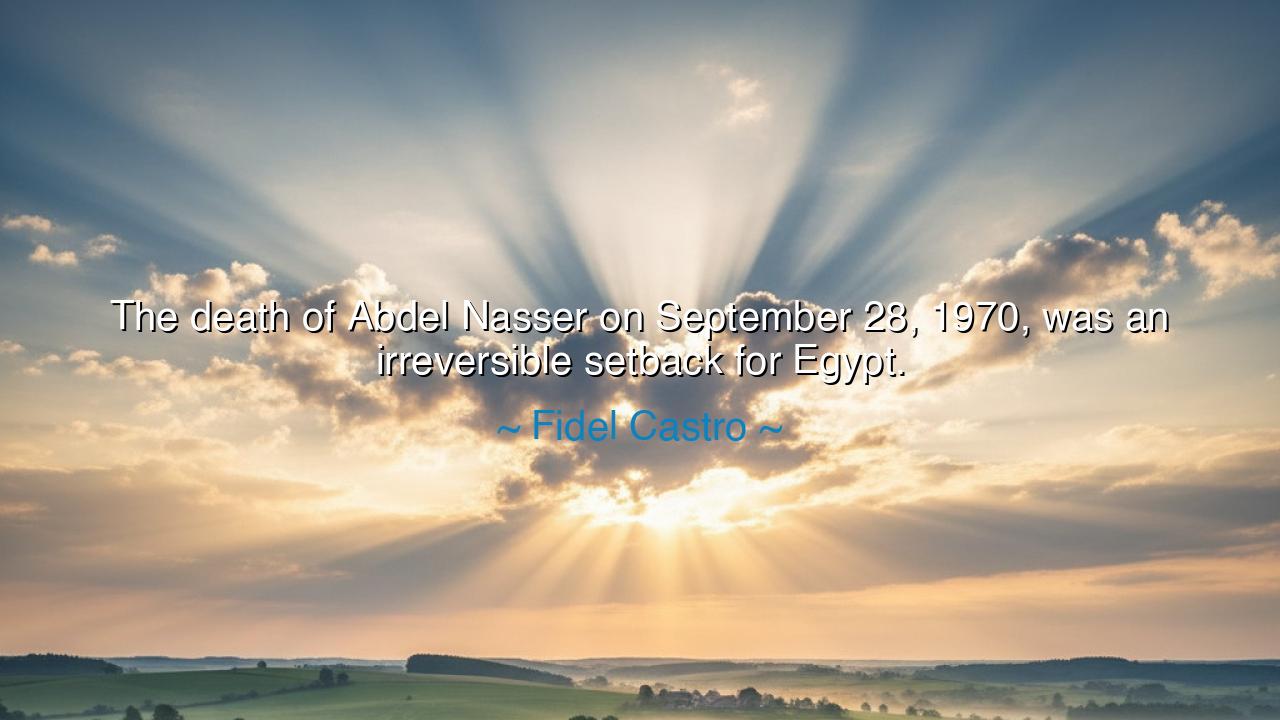
The death of Abdel Nasser on September 28, 1970, was an
The death of Abdel Nasser on September 28, 1970, was an irreversible setback for Egypt.





When Fidel Castro declared, “The death of Abdel Nasser on September 28, 1970, was an irreversible setback for Egypt,” he was not merely mourning the passing of a man, but lamenting the fall of an era — an era of revolutionary vision, of unity, and of defiance against imperial power. In his words, one hears not only grief but recognition: that in the death of Gamal Abdel Nasser, Egypt and the wider Arab world lost more than a leader — they lost a symbol, a beacon whose flame had burned against the winds of colonialism and despair. To call his death “irreversible” was to say that the void left behind could not easily be filled, for it was the absence not of one ruler, but of a soul that had embodied a people’s dream of dignity.
Nasser, the son of a postal worker, rose from humble beginnings to shape the destiny of a nation and a region. He led the Egyptian Revolution of 1952, ending the rule of kings and the shadow of foreign powers that had long held Egypt in their grasp. Under his hand, Egypt was transformed from a subject nation to the heart of the Arab world’s awakening. He nationalized the Suez Canal, standing unbowed against Britain, France, and Israel — an act of defiance that resounded across continents. His voice spoke of independence, socialism, and unity; his spirit gave strength to those who had been told for centuries that they were powerless. To the poor, he was hope. To the colonized, he was proof that courage could rewrite destiny.
It was this courage that Castro, himself a revolutionary, recognized and revered. Both men were bound by a common faith in the power of the oppressed to rise. Both challenged empires and sought to forge a world where nations could walk in sovereignty. When Castro called Nasser’s death an “irreversible setback,” he spoke as a comrade in the eternal struggle for justice. He saw in Nasser not just a leader of Egypt, but a pillar of a greater movement — the Non-Aligned Movement, a gathering of nations refusing to bow to either East or West during the Cold War. In losing Nasser, the developing world lost one of its most eloquent and fearless voices.
The death of such men is always more than the silence of their hearts; it is the trembling of an age. After Nasser’s passing, Egypt’s course began to change. The fiery independence he embodied cooled into diplomacy; the dreams of Arab unity began to fracture. His successor, Anwar Sadat, steered Egypt toward new alliances, and the balance of the Middle East shifted. To Castro — who remained steadfast in his revolutionary ideals — this change marked a turning point, a loss of spirit that could not be undone. The revolution’s soul, he believed, had departed with Nasser’s breath.
Yet in this sorrow lies a profound truth about leadership and legacy. Great men do not die as others do. Their bodies perish, but their ideals echo across generations. Nasser’s name still burns in the hearts of those who dream of freedom and justice in the Arab world. His vision — of a proud Egypt leading a united, self-reliant people — remains both memory and prophecy. Though Castro called his death an irreversible setback, even he would have known that such spirits never vanish; they become part of the eternal current that drives humanity forward. What dies is the form — what endures is the fire.
Throughout history, such moments have repeated themselves. The death of Alexander the Great left his empire divided and his vision unfulfilled. The passing of Lincoln left America trembling on the edge of its reconstruction. The assassination of Martin Luther King Jr. dimmed, for a time, the march for civil rights. And yet, though each loss seemed an “irreversible setback,” the ideals they carried — unity, freedom, equality — rose again, carried by new voices, new hearts. So too with Nasser: his death was a wound to Egypt, but his spirit became a seed, scattered across the sands of time.
So take this lesson, child of nations: when a great leader falls, mourn not only his loss but remember the duty he leaves behind. Grief must not turn to despair, but to action. Do not wait for another Nasser, another torchbearer — instead, kindle within yourself the same courage that moved him to defy the mighty. Let every heart that yearns for justice become a continuation of that unbroken flame. For though Fidel Castro spoke of setback, the true legacy of visionaries like Nasser is eternal. They die, but their cause does not. They fall, but their dream marches on — carried by those who refuse to let the horizon grow dark.






AAdministratorAdministrator
Welcome, honored guests. Please leave a comment, we will respond soon